八下英语单元笔记
英语八年级下册第五单元笔记
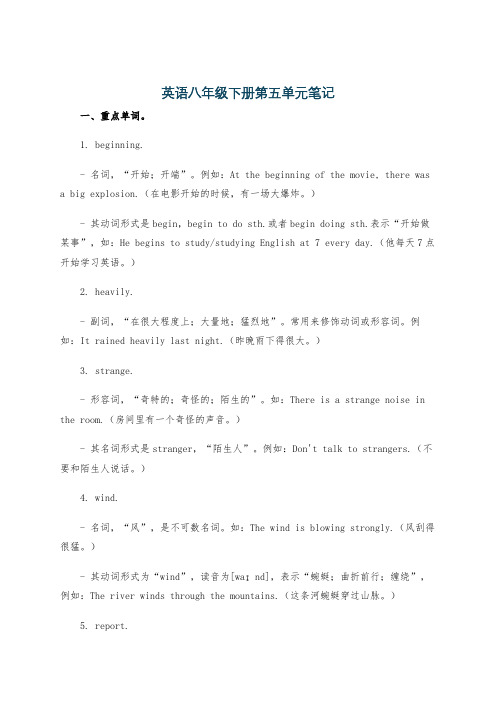
英语八年级下册第五单元笔记一、重点单词。
1. beginning.- 名词,“开始;开端”。
例如:At the beginning of the movie, there was a big explosion.(在电影开始的时候,有一场大爆炸。
)- 其动词形式是begin,begin to do sth.或者begin doing sth.表示“开始做某事”,如:He begins to study/studying English at 7 every day.(他每天7点开始学习英语。
)2. heavily.- 副词,“在很大程度上;大量地;猛烈地”。
常用来修饰动词或形容词。
例如:It rained heavily last night.(昨晚雨下得很大。
)3. strange.- 形容词,“奇特的;奇怪的;陌生的”。
如:There is a strange noise in the room.(房间里有一个奇怪的声音。
)- 其名词形式是stranger,“陌生人”。
例如:Don't talk to strangers.(不要和陌生人说话。
)4. wind.- 名词,“风”,是不可数名词。
如:The wind is blowing strongly.(风刮得很猛。
)- 其动词形式为“wind”,读音为[waɪnd],表示“蜿蜒;曲折前行;缠绕”,例如:The river winds through the mountains.(这条河蜿蜒穿过山脉。
)5. report.- 名词,“报告;报道”。
例如:I read a report about the accident in the newspaper.(我在报纸上读到了一篇关于这个事故的报道。
)- 动词,“报道;公布”。
如:The journalist reported the news on TV.(这位记者在电视上报道了这条新闻。
八年级下册第六单元英语笔记
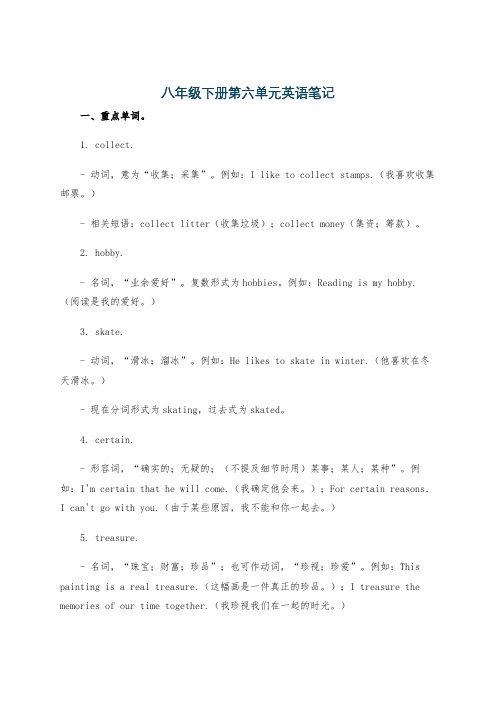
八年级下册第六单元英语笔记一、重点单词。
1. collect.- 动词,意为“收集;采集”。
例如:I like to collect stamps.(我喜欢收集邮票。
)- 相关短语:collect litter(收集垃圾);collect money(集资;筹款)。
2. hobby.- 名词,“业余爱好”。
复数形式为hobbies。
例如:Reading is my hobby.(阅读是我的爱好。
)3. skate.- 动词,“滑冰;溜冰”。
例如:He likes to skate in winter.(他喜欢在冬天滑冰。
)- 现在分词形式为skating,过去式为skated。
4. certain.- 形容词,“确实的;无疑的;(不提及细节时用)某事;某人;某种”。
例如:I'm certain that he will come.(我确定他会来。
);For certain reasons, I can't go with you.(由于某些原因,我不能和你一起去。
)5. treasure.- 名词,“珠宝;财富;珍品”;也可作动词,“珍视;珍爱”。
例如:This painting is a real treasure.(这幅画是一件真正的珍品。
);I treasure the memories of our time together.(我珍视我们在一起的时光。
)6. island.- 名词,“岛”。
例如:There is a beautiful island in the sea.(海里有一个美丽的岛。
)7. page.- 名词,“(书刊或纸张的)页;面;张”。
例如:Turn to page 10.(翻到第10页。
)8. hurry.- 动词,“匆忙;赶快”;名词,“匆忙;急忙”。
- 常用短语:hurry up(赶快;急忙(做某事));in a hurry(匆忙地;急于)。
例如:Hurry up, or we'll be late.(快点,否则我们要迟到了。
八下英语八单元2b笔记

八下英语八单元2b笔记
八下英语八单元2b笔记
本单元的主题是“文化之旅”。
我们将学习关于不同国家和地区的文化、风俗和名胜古迹的知识。
以下是我们在本单元学到的一些重点内容:
1. 文化差异:我们学习了不同国家和地区的文化差异。
例如,中国人在过年时会贴春联、放鞭炮,而西方国家则会在圣诞节时装饰圣诞树、交换礼物。
了解这些文化差异有助于我们更好地理解和尊重他人的文化。
2. 风俗习惯:我们了解了不同国家和地区的风俗习惯。
例如,在英国的下午茶时间,人们会品尝茶和小点心,而在日本,人们在温泉中泡澡,被认为是一种放松和净化身心的方式。
3. 名胜古迹:我们学习了一些世界著名的名胜古迹。
例如,埃及的金字塔、巴黎的埃菲尔铁塔和巴西的基督像等。
通过学习这些名胜古迹,我们可以了解到世界各地的历史和文化。
4. 旅游经验:我们学习了如何进行一次顺利的旅行。
从选择目的地、预订机票和酒店,到了解当地的交通和食物,我们掌握了一些旅游经
验,可以帮助我们在旅行中更好地适应和享受。
通过学习本单元的内容,我们不仅扩展了自己的知识面,还培养了对不同文化的尊重和理解。
希望我们能够将这些知识应用到实际生活中,与世界各地的人们更好地交流和合作。
八年级下册人教版英语笔记

八年级下册人教版英语笔记一、Unit 1 What's the matter?1. 重点单词。
- matter:n. 问题;事情。
常用搭配:What's the matter (with sb.)? = What's wrong (with sb.)? = What's the trouble (with sb.)?(某人)怎么了?- sore:adj. 疼痛的;酸痛的。
例如:a sore throat喉咙痛。
- stomachache:n. 胃痛;腹痛。
- foot:n. 脚;足。
复数形式是feet。
- neck:n. 脖子;颈部。
- fever:n. 发烧。
have a fever发烧。
- lie:v. (lay - lain)躺;平躺。
lie down躺下。
- rest:v. & n. 放松;休息。
take breaks/take a break = have a rest休息。
- cough:v. & n. 咳嗽。
have a cough咳嗽。
- toothache:n. 牙痛。
2. 重点短语。
- have a cold:感冒。
- have a stomachache:胃痛。
- lie down and rest:躺下休息。
- drink some hot tea with honey:喝些加蜂蜜的热茶。
- see a dentist:看牙医。
- get an X - ray:拍X光片。
- take one's temperature:量体温。
3. 重点句型。
- What should I do? 我应该做什么?- You should see a dentist and get an X - ray. 你应该去看牙医并拍X光片。
- Should I put some medicine on it? 我应该在上面敷些药吗?- Yes, you should. / No, you shouldn't. 是的,你应该。
八下英语五单元笔记
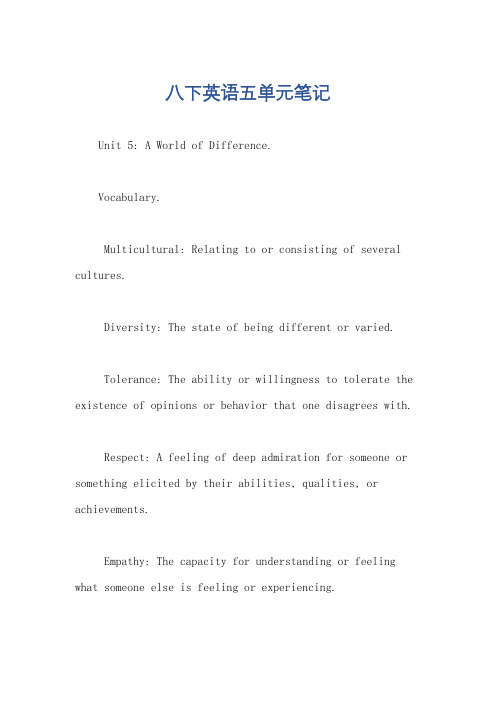
八下英语五单元笔记Unit 5: A World of Difference.Vocabulary.Multicultural: Relating to or consisting of several cultures.Diversity: The state of being different or varied.Tolerance: The ability or willingness to tolerate the existence of opinions or behavior that one disagrees with.Respect: A feeling of deep admiration for someone or something elicited by their abilities, qualities, or achievements.Empathy: The capacity for understanding or feeling what someone else is feeling or experiencing.Grammar.Present perfect tense: Used to describe actions or events that started in the past and continue to the present or have recently finished.Past perfect tense: Used to describe actions or events that happened before another action or event in the past.Comparative and superlative adjectives: Used to compare two or more things or people.Reading Comprehension.Passage 1: The Importance of Cultural Diversity.Cultural diversity is essential for a thriving and vibrant society. It brings together people from different backgrounds, experiences, and perspectives, creating a rich tapestry of traditions, beliefs, and values. Each culture contributes its unique flavor to the collective whole, making it more dynamic and resilient.Diversity promotes creativity and innovation. When people from diverse backgrounds come together, they share their ideas and perspectives, leading to new and innovative solutions. It also fosters tolerance and understanding. By interacting with people from different cultures, we develop empathy and a greater appreciation for the ways of lifethat differ from our own.Furthermore, cultural diversity is crucial for economic prosperity. It attracts global talent and investment, creating jobs and stimulating economic growth. It also helps businesses cater to diverse customer bases and expand into new markets.Passage 2: The Challenges of Cultural Diversity.While cultural diversity offers many benefits, it also presents challenges. Differences in language, customs, and beliefs can lead to misunderstandings, conflicts, and even discrimination. Prejudice and stereotypes can hinder communication and cooperation.Overcoming these challenges requires active effort and a commitment to respect and tolerance. It involves educating ourselves about different cultures, listening to others' perspectives, and valuing their contributions. By fostering empathy and open-mindedness, we can create a society where everyone feels included and respected.Listening.Dialogue 1: A Conversation about Cultural Diversity.Speaker 1: I think cultural diversity is so important. It makes our society so much more interesting and vibrant.Speaker 2: I agree. It's fascinating to learn about different cultures and traditions.Speaker 1: But it can also be challenging sometimes. Different cultures have different values and beliefs, which can lead to misunderstandings.Speaker 2: That's true. But I think it's important to try to understand and respect each other's differences.Dialogue 2: A Discussion about the Challenges of Diversity.Speaker 1: I'm worried about the challenges of diversity. I think it can lead to division and conflict.Speaker 2: I can understand your concerns. But I believe that the benefits of diversity outweigh the challenges.Speaker 1: Maybe you're right. But I think we need to be careful to avoid letting our differences divide us.Speaker 2: I agree. We need to work together to create a society where everyone feels included and respected.Speaking.Discussion Topics.The importance of cultural diversity in society.The challenges of cultural diversity and how to overcome them.Personal experiences with cultural diversity.Presentation Tips.Choose a topic that you are passionate about.Research your topic thoroughly.Organize your ideas clearly and logically.Use vivid language and examples to engage your audience.Practice your presentation several times.Be confident and enthusiastic.。
八年级英语下册第三单元笔记

八年级英语下册第三单元笔记一、重点单词。
1. rubbish.- n. 垃圾;废弃物。
例如:There is a lot of rubbish on the street.(街道上有很多垃圾。
)2. fold.- v. 折叠;对折。
如:Fold the paper in half.(把纸对折。
)3. sweep.- v. (swept, swept) 扫;打扫。
例如:I sweep the floor every day.(我每天扫地。
)4. floor.- n. 地板;地面。
如:The book is on the floor.(书在地板上。
)5. mess.- n. 杂乱;不整洁。
例如:What a mess!(多么杂乱啊!)6. throw.- v. (threw, thrown) 扔;掷。
例如:Don't throw rubbish everywhere.(不要到处扔垃圾。
)7. neither.- adv. 也不。
用于否定句中,表示前面所说的情况也适用于后者。
例如:He doesn't like apples, neither do I.(他不喜欢苹果,我也不喜欢。
)- pron. 两者都不。
例如:Neither of them is right.(他们两个都不对。
)8. shirt.- n. 衬衫。
如:This is a white shirt.(这是一件白色的衬衫。
)9. pass.- v. 给;递;走过;通过。
例如:Pass me the salt, please.(请递给我盐。
);He passed the exam.(他通过了考试。
)10. borrow.- v. 借;借用。
例如:Can I borrow your pen?(我能借用你的钢笔吗?)11. lend.- v. (lent, lent) 借给;借出。
例如:I can lend you some money.(我可以借给你一些钱。
英语八年级下册第6单元笔记
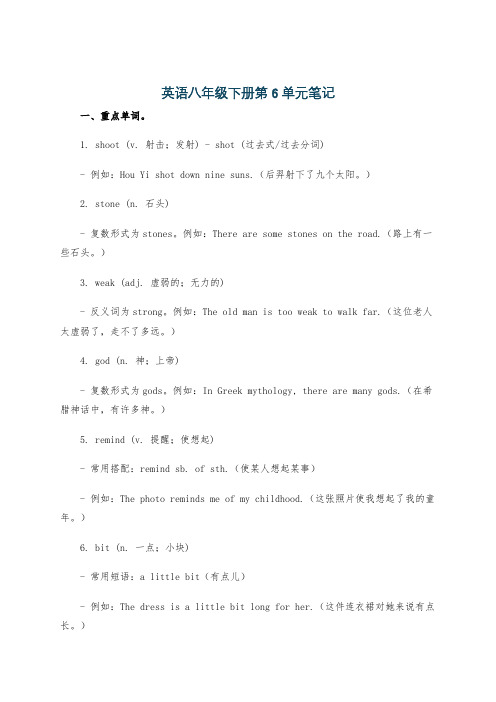
英语八年级下册第6单元笔记一、重点单词。
1. shoot (v. 射击;发射) - shot (过去式/过去分词)- 例如:Hou Yi shot down nine suns.(后羿射下了九个太阳。
)2. stone (n. 石头)- 复数形式为stones。
例如:There are some stones on the road.(路上有一些石头。
)3. weak (adj. 虚弱的;无力的)- 反义词为strong。
例如:The old man is too weak to walk far.(这位老人太虚弱了,走不了多远。
)4. god (n. 神;上帝)- 复数形式为gods。
例如:In Greek mythology, there are many gods.(在希腊神话中,有许多神。
)5. remind (v. 提醒;使想起)- 常用搭配:remind sb. of sth.(使某人想起某事)- 例如:The photo reminds me of my childhood.(这张照片使我想起了我的童年。
)6. bit (n. 一点;小块)- 常用短语:a little bit(有点儿)- 例如:The dress is a little bit long for her.(这件连衣裙对她来说有点长。
)7. silly (adj. 愚蠢的;不明事理的)- 例如:It's silly of you to do such a thing.(你做这样的事很愚蠢。
)8. object (n. 物体;物品)- 例如:There are many strange objects in the museum.(博物馆里有许多奇怪的物品。
)二、重点短语。
1. once upon a time.- 意为“从前”,常用于故事的开头。
例如:Once upon a time, there was a beautiful princess.(从前,有一位美丽的公主。
八年级下册英语第五单元笔记

八年级下册英语第五单元笔记一、重点短语at the time of 当.......时候be killed 被杀害beat against... 拍打……break...apart 使……分离bring... together 使……靠拢by the side of the road 在路边die down 逐渐变弱;逐渐消失fall asleep 进人梦乡;睡着for example 例如go off (闹钟)发出响声have meaning to 对……有意义hear the news 听到这个消息important events in history 历史重大事件in a mess 一团糟in silence 沉默;无声in the area 在这个地区in times of difficulty 在困难的时候make one's way to.... 在某人去……的路上make sure 确信;确认miss the bus 错过公交车miss the event 错过这个事件more recently 最近地;新近on the radio 通过广播on TV 在电视上more than 50/over 50 50多(岁)pick up 接电话remember doing sth. 记得做过某事remember to do sth. 记得去做某事take a hot shower 洗热水澡take down 拆除;摧毁the Animal Helpline 动物保护热线the World Trade Center 世贸中心try doing sth. 尝试做某事try to do sth. 努力做某事wake up 醒来;叫醒……walk by 走路经过二、词法精选1.when和while的区别(1)表示“当……的时候”,如后面连接的动词为进行时态,则用while多于用when。
而when通常与瞬间性动词或延续性不强的动词连用。
八下英语第三单元笔记
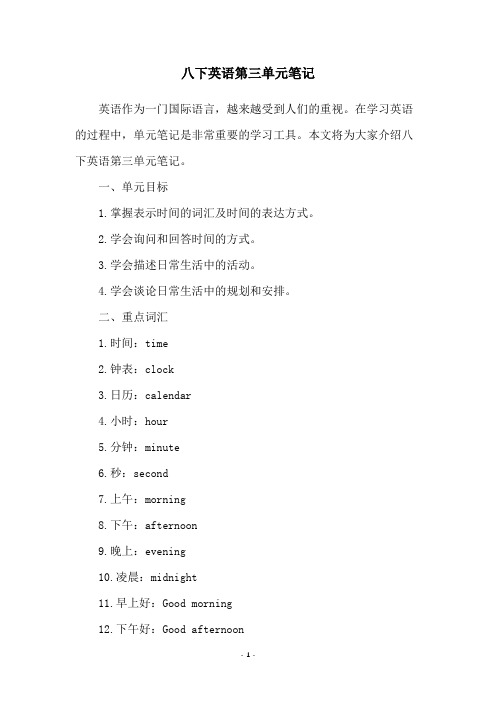
八下英语第三单元笔记英语作为一门国际语言,越来越受到人们的重视。
在学习英语的过程中,单元笔记是非常重要的学习工具。
本文将为大家介绍八下英语第三单元笔记。
一、单元目标1.掌握表示时间的词汇及时间的表达方式。
2.学会询问和回答时间的方式。
3.学会描述日常生活中的活动。
4.学会谈论日常生活中的规划和安排。
二、重点词汇1.时间:time2.钟表:clock3.日历:calendar4.小时:hour5.分钟:minute6.秒:second7.上午:morning8.下午:afternoon9.晚上:evening10.凌晨:midnight11.早上好:Good morning12.下午好:Good afternoon13.晚上好:Good evening14.昨天:yesterday15.今天:today16.明天:tomorrow三、语法要点1.表示时间的基本语法结构:时间+动词例如:What time do you get up?I get up at 7:00.2.表示时间的特殊语法结构:动词+时间例如:I have lunch at 12:00.3.使用介词表示时间:at表示具体时间点,例如:at 8:00in表示一段时间,例如:in the morning on表示特定日期,例如:on Monday四、对话模板1.询问时间A: Excuse me, what time is it?B: It's 3:30.2.回答时间A: What time is it?B: It's 6:45.3.询问活动时间A: What time do you have breakfast? B: I have breakfast at 7:00.4.回答活动时间A: What time do you have lunch?B: I have lunch at 12:00.五、常用句型1.时间的表达方式What time is it?It's 8 o'clock.2.询问活动时间What time do you have breakfast?I have breakfast at 7:00.3.描述活动的时间I have lunch at 12:00.4.谈论日常生活安排What are you going to do tomorrow? I'm going to visit my grandparents.六、学习建议1.掌握时间的表达方式。
人教英语八下_Unit 1 Section A 重点单词笔记

人教版八年级下册各单元重点单词笔记Unit1 SectionA1.mattern.问题;事情(1)询问某人的情况=problem重点句型怎么了? What’s the matter (with sb.)? 注意这里的the必须要加What’s wrong with sb.? What’s up? What’s the problem/trouble with sb.?互换(2)表示一个问题或一件事情e.g. They had some important matters to discuss.(3)关于...的问题a matter of sth./doing sth.e.g. Making a plan is a matter of choosing the best time and activities.补充:no matter who/what/when/where 无论...v.有影响matter to sb. 对某人有影响It doesn’t matter to me what you do. 你做什么对我没影响(你做什么我无所谓)2.重要的名词(身体部位)(下列均可数)arm n. 手臂back n. 背,背部ear n. 耳朵eye n. 眼睛foot n. 脚(复数为feet)hand n. 手head n. 头leg n. 腿mouth n. 嘴巴neck n. 脖子nose n. 鼻子stomach n. 胃tooth n. 牙齿(复数为teeth)3.表达生病的用法总结(用have表示得了某种病)(1)have a +疾病名称have a cold/fever/cough 感冒/发烧/咳嗽发高烧have a high fever He is coughing (2)have a +部位+ache n.表示疼痛have a stomach ache/tooth ache/head ache(3)have a +sore adj. 疼痛的;酸痛的+疼痛部位have a sore throat/back——have a very /really sore throat/back√4.liev. ①躺lie-lying-lay-laine.g. As long as you lie down and rest, you will feel much better tomorrow.The bus driver saw an old man lying on the side of the road.①撒谎lie-lying-lied-liede.g.lie to sb. 对某人说谎Don’t lie to me!n. 谎言tell a lie5.restn. ①休息时间(睡眠时间)have/take a good rest①剩余部分;其余the rest of sth.e.g. I would like to spend the rest of my life living with you.v. =relax 休息;放松e.g. Rest your eyes every half an hour.He won’t rest until he finds her.6.breakv. break-broke-broken已学,之前笔记有n. 间歇,休息,暂停(指短暂地歇了一下)①lunch/tea/class break 午饭/下午茶/课间的休息时间①take a break/ take breaksHe worked all day without a break=He worked all day without taking a breakYou need to take breaks away form the computers.7.hurtv. hurt-hurt-hurt①hurt sb./hurt oneself 使疼痛;使受伤He hurt his back /himself when he played tennis outside.If your head and neck still hurt tomorrow, then go to the doctor.①hurt oneself doing sth. 做某事弄伤了自己John hurt himself cutting up the carrots.①hurt one’s feeling 伤害某人的感情/使不快It hurt me to know that he lied to me.adj. 受伤的None of the passengers were badly hurt.8.off adv./prep. 本身意义一般指远离,主要总结含有off的动词短语get off 下车-get on 上车turn off 关上-turn on 打开take off 脱下;飞机火箭的起飞发射put off 推迟cut off 切除take/have three days off 请三天假9.to one’s surprise 一般位于句首,单独用(逗号隔开)10.onto prep. 本身意义一般指朝,向e.g. Some passengers helped Mr.Wang to move the man onto the bus11.troubleUCN(不可数名词). 困难;苦恼e.g. People don’t want to help others because they do not want any trouble.①be in trouble处于困境中Although we are in trouble, we won’t give up.e.g. Now he is in trouble, we should try our best to help him①get (sb.) into trouble (使某人)陷入困境中e.g. If I don’t arrive home on time, I’ll get into trouble!My brother always gets me into trouble with my parents.①have trouble with sth.=have trouble (in) doing sth.做某事有困难e.g. His son had trouble (in)working out the math problem.I had trouble in understanding the meaning of the word.补充:同义的还有have difficulties/problems with sth.=have difficulties/problems (in) doing sth. trouble也可做可数名词,意思是一件麻烦事,烦心事V. 使烦恼,使忧虑;麻烦某人trouble sb.e.g. Sorry to trouble you, but could you tell me the time?What is troubling you these days?12.hitV. hit-hit-hit击;打;撞击①hit sb. (with sth.)e.g. Bus No.26 hit an old man on Zhonghua Road.My parents never hit me when I was a child.①hit sb. +prep.+ the 身体部位hit me on the head/hit him in the facee.g. She hit him on his head with her umbrella.补充:hit常用于被动语态be done e.g. I was hit by a stone.13.right away =at once= in a minute= immediately 立刻;马上The old man had a heart problem and needed to go to the hospital right away.。
英语八年级下册第一单元笔记

英语八年级下册第一单元笔记一、重点单词。
1. matter.- n. 问题;事情。
例如:What's the matter?(怎么了?)- v. 重要;要紧。
例如:It doesn't matter.(没关系。
)2. stomachache.- n. 胃痛;腹痛。
这是一个合成词,由“stomach(胃)+ache(疼痛)”构成。
3. foot.- n. 脚;足。
复数形式是“feet”。
例如:I hurt my feet.(我伤到我的脚了。
)4. neck.- n. 颈;脖子。
5. fever.- n. 发烧。
例如:He has a high fever.(他发高烧了。
)6. lie.- v. (lay - lain)躺;平躺。
例如:You should lie down and rest.(你应该躺下休息。
)- v. 说谎。
过去式是“lied”,过去分词是“lied”。
例如:He lied to me.(他对我撒谎了。
)7. rest.- v. & n. 放松;休息。
例如:Let's have a rest.(让我们休息一下吧。
)8. cough.- v. & n. 咳嗽。
例如:He coughs a lot.(他咳嗽得很厉害。
)9. X - ray.- n. X射线;X光。
10. toothache.- n. 牙痛。
也是合成词,“tooth(牙齿)+ache(疼痛)”。
二、重点短语。
1. have a cold.- 感冒。
例如:I have a cold. I feel terrible.(我感冒了。
我感觉很糟糕。
)2. have a stomachache.- 胃痛;肚子疼。
3. lie down.- 躺下。
4. take one's temperature.- 量体温。
例如:You should take your temperature first.(你应该先量一下体温。
英语八下第二单元笔记

英语八下第二单元笔记The second unit of English class in eighth grade covers various topics such as wildlife conservation, environmental protection, and the importance of biodiversity. 这门英语课八年级第二单元涵盖了各种主题,如野生动物保护、环境保护以及生物多样性的重要性。
One of the key lessons in this unit is the impact of human activities on the environment, specifically how deforestation, pollution, and habitat destruction affect ecosystems and wildlife. 这个单元的一个关键教训是人类活动对环境的影响,特别是森林砍伐、污染和栖息地破坏对生态系统和野生动物的影响。
Through studying this unit, students can gain a better understanding of the interconnectedness of all living things and the importance of preserving natural habitats for future generations. 通过学习这个单元,学生们可以更好地理解所有生物之间的相互联系,以及为了子孙后代保存自然栖息地的重要性。
Moreover, students will also learn about the role of national parks and wildlife reserves in protecting endangered species andpromoting biodiversity. 此外,学生们还将了解国家公园和野生动物保护区在保护濒危物种和促进生物多样性方面的作用。
八年级下册英语笔记重点归纳

八年级下册英语笔记重点归纳一、Unit 1 What's the matter?1. 重点单词。
- matter n.问题;事情。
常用搭配:What's the matter (with sb.)?(某人)怎么了?- have a cold 感冒。
类似的表达还有:have a fever(发烧),have a cough (咳嗽)等。
- stomachache n.胃痛;腹痛。
“-ache”为后缀,表示疼痛,如:headache (头痛),toothache(牙痛)。
- foot n.脚,复数形式为feet。
- lie v.躺;平躺。
lie - lay - lain。
例如:You should lie down and rest.(你应该躺下休息。
)- rest v. n.放松;休息。
如:take a rest(休息一下)。
2. 重点短语。
- take one's temperature 量体温。
例如:The nurse took my temperature.(护士给我量了体温。
)- take breaks (take a break) 休息。
We should take breaks when we are tired.(当我们累的时候应该休息。
)- get off 下车。
He got off the bus at the next stop.(他在下一站下了公共汽车。
)- to one's surprise 使……惊讶的是;出乎……的意料。
To my surprise, he passed the exam.(令我惊讶的是,他通过了考试。
)- What should I do? 我应该做什么?用于询问建议。
- You should see a dentist and get an X - ray. 你应该去看牙医并且拍个X 光片。
should为情态动词,后接动词原形,表示建议。
英语八下第九单元笔记

英语八下第九单元笔记重点短语a couple of times 好几次a great way to spend a Saturday afternoon 一个过周六下午的好办法a nice place to enjoy tea一个品茶的好地方all the old movie camera所有的古老的电影摄影机all year round一年到头,终年an amusement park with a special theme一个有特别的主题的游乐园an English-speaking country一个讲英语的国家be far from离……远camp in the mountains在大山里露营development of toilets厕所的发展different kinds of 各种各样的during the daytime 在白天encourage sb. to do sth鼓励某人做某事go skating 去滑冰go somewhere different去不同的地方have a problem doing sth做某事很困难have been to sp. 去过某地hear of 听说in a more natural environment在一个更加自然的环境中in such a rapid way以如此速猛的方式in the dark 在黑暗中in the past 在过去learn about sth了解有关,的情况make a perfect cup of tea with beautiful tea sets 用漂亮的茶具沏一杯完美的茶on the one hand....on the other hand一方面,另一方面on the weekend 在周末put up a tent 搭帐篷right now 现在,目前science museum 科学博物馆social groups 社会团体southeast Asia 东南亚take a ride 兜风take the subway 坐地铁the tea art performances茶艺表演the Terracotta Army 兵马俑Thousands of 数以千计的three quarters 四分之三Walk around the park在公园里到处走词法精选1.encourage 鼓励及物动词,意为“鼓励”,encourage sb.to do sth. 鼓励某人做某事,encourage sb.in sth.在某方面鼓励某人。
八年级下册英语第8单元笔记
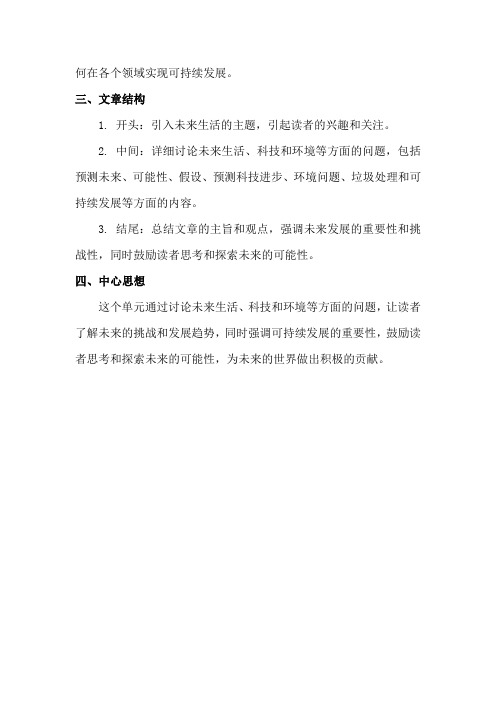
八年级下册英语第8单元笔记一、课文主题这个单元主要涉及未来生活的主题,包括未来生活、科技和环境等方面的内容,以及相关的语法和词汇知识。
二、重点词句1. 未来生活:描述未来生活的特点、优点和挑战,包括未来科技、环境、城市和生活方式等方面。
2. 预测未来:使用一般将来时和情态动词来表达对未来的预测和猜测,例如“will do”和“can/could do”等。
3. 可能性:描述某个事件或情况的可能性或概率,使用情态动词表达,例如“may/might do”和“will/would/could do”等。
4. 假设:使用if引导的条件状语从句来表达假设或条件,例如“if…,…”。
5. 预测:表示对未来某个事件或情况做出预测或预见,例如“predict/predict that…”等。
6. 科技进步:描述科技进步对未来生活的影响和作用,例如人工智能、机器人、医疗技术等方面的进步。
7. 环境问题:讨论未来环境问题的挑战和解决方案,例如气候变化、资源消耗、可再生能源等方面的问题。
8. 垃圾处理:了解未来垃圾处理技术的发展趋势,例如循环利用、生物降解等。
9. 可持续发展:了解可持续发展的概念和重要性,以及未来如何在各个领域实现可持续发展。
三、文章结构1. 开头:引入未来生活的主题,引起读者的兴趣和关注。
2. 中间:详细讨论未来生活、科技和环境等方面的问题,包括预测未来、可能性、假设、预测科技进步、环境问题、垃圾处理和可持续发展等方面的内容。
3. 结尾:总结文章的主旨和观点,强调未来发展的重要性和挑战性,同时鼓励读者思考和探索未来的可能性。
四、中心思想这个单元通过讨论未来生活、科技和环境等方面的问题,让读者了解未来的挑战和发展趋势,同时强调可持续发展的重要性,鼓励读者思考和探索未来的可能性,为未来的世界做出积极的贡献。
英语八年级下册第七单元笔记

英语八年级下册第七单元笔记一、重点单词。
1. square.- n. 平方;正方形。
例如:The area of this square is 100 square meters.(这个正方形的面积是100平方米。
)- adj. 平方的;正方形的。
如:a square box(一个正方形的盒子)2. meter.- n. 米;公尺。
它是长度单位,复数形式是“meters”。
例如:The building is 50 meters high.(这栋楼50米高。
)3. deep.- adj. 深的;纵深的。
例如:The river is very deep.(这条河很深。
)- adv. 深深地。
如:dig deep(深挖)4. desert.- n. 沙漠。
例如:The Sahara Desert is very large.(撒哈拉沙漠非常大。
)- v. 舍弃;遗弃。
如:He was deserted by his friends.(他被他的朋友们遗弃了。
)5. population.- n. 人口;人口数量。
提问人口数量用“What's the population of...?”例如:What's the population of China?(中国的人口是多少?)注意:population作主语时,谓语动词的单复数形式要根据情况而定。
如果表示人口的整体概念,谓语动词用单数;如果表示人口中的具体人数,谓语动词用复数。
如:The population ofthe city is large.(这个城市的人口众多。
)One third of the population here are workers.(这里三分之一的人口是工人。
)6. Asia.- n. 亚洲。
例如:China is in Asia.(中国在亚洲。
)7. tour.- n. 旅行;旅游。
例如:They are on a tour of France.(他们正在法国旅行。
八下英语笔记人教版手写

八下英语笔记人教版手写 English Answer:Unit 1。
Vocabulary:weather words.feelings and emotions.daily routines.Grammar:present simple tense.present continuous tense.present perfect tense.simple past tense.Communication:talking about the weather.expressing feelings and emotions. describing daily routines.Unit 2。
Vocabulary:school subjects.classroom objects.school activities.Grammar:comparative and superlative adjectives. possessive pronouns.reflexive pronouns.modal verbs.Communication:talking about school subjects.describing classroom objects.discussing school activities.Unit 3。
Vocabulary:food and drinks.restaurant vocabulary.shopping vocabulary.Grammar:present progressive tense.past progressive tense.future simple tense.future continuous tense.Communication:ordering food and drinks in a restaurant. going shopping.talking about food and drinks.Unit 4。
八年级下册英语第一单元笔记
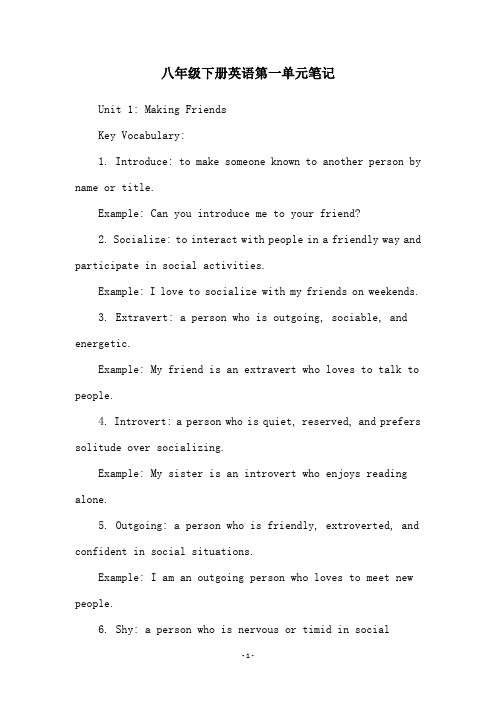
八年级下册英语第一单元笔记Unit 1: Making FriendsKey Vocabulary:1. Introduce: to make someone known to another person by name or title.Example: Can you introduce me to your friend?2. Socialize: to interact with people in a friendly way and participate in social activities.Example: I love to socialize with my friends on weekends.3. Extravert: a person who is outgoing, sociable, and energetic.Example: My friend is an extravert who loves to talk to people.4. Introvert: a person who is quiet, reserved, and prefers solitude over socializing.Example: My sister is an introvert who enjoys reading alone.5. Outgoing: a person who is friendly, extroverted, and confident in social situations.Example: I am an outgoing person who loves to meet new people.6. Shy: a person who is nervous or timid in socialsituations and lacks confidence.Example: My cousin is very shy and doesn't like to speak in public.7. Approachable: a person who is easy to talk to and friendly.Example: My teacher is very approachable and always willing to help us.8. Empathy: the ability to understand and share the feelings of another person.Example: I have empathy for my friend who lost her dog.9. Conflict: a disagreement or argument between individuals or groups.Example: There was a conflict between my parents about where to go on vacation.10. Compromise: a settlement in which both parties give up something to reach an agreement.Example: My friends and I had to compromise on where to eat for dinner.Key Phrases:1. Breaking the ice: starting a conversation with someone you don't know very well.Example: I tried breaking the ice with my new classmate byasking her about her hobbies.2. Hanging out: spending time with friends in a casual and relaxed environment.Example: We are planning to hang out at the mall this weekend.3. Making small talk: engaging in light conversation to get to know someone better.Example: I made small talk with my new neighbor about the weather.4. Getting to know: becoming acquainted with someone by learning about their interests and personality.Example: I am getting to know my new co-worker by asking her about her job experience.5. Breaking the barrier: overcoming shyness or awkwardness in social situations.Example: I broke the barrier with my new friend by sharing a funny story.Tips for Making Friends:1. Be approachable: Smile, make eye contact, and be friendly towards others.2. Show interest: Ask questions and listen actively to what others have to say.3. Join groups and clubs: Participate in activities that interest you and meet others who share your hobbies.4. Be yourself: Don't try to be someone you're not. Authenticity is important in building genuine relationships.5. Take initiative: Don't be afraid to make the first move in approaching someone and starting a conversation.。
八下英语第三单元笔记人教版
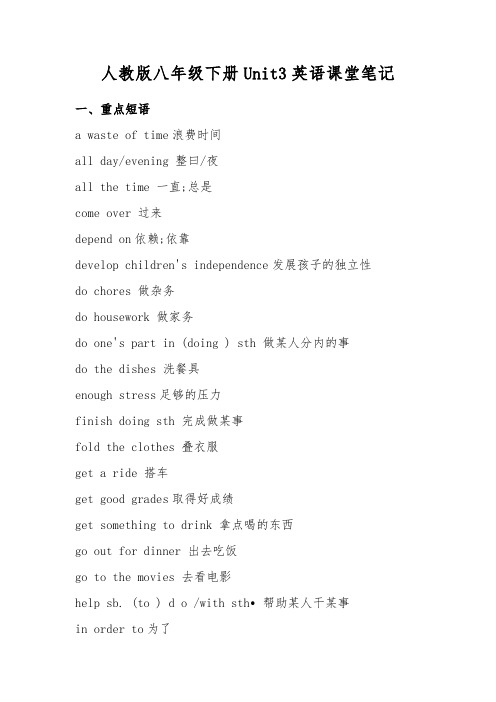
人教版八年级下册Unit3英语课堂笔记一、重点短语a waste of time浪费时间all day/evening 整曰/夜all the time 一直;总是come over 过来depend on依赖;依靠develop children's independence发展孩子的独立性do chores 做杂务do housework 做家务do one's part in (doing ) sth 做某人分内的事do the dishes 洗餐具enough stress足够的压力finish doing sth 完成做某事fold the clothes 叠衣服get a ride 搭车get good grades取得好成绩get something to drink 拿点喝的东西go out for dinner 出去吃饭go to the movies 去看电影help sb. (to ) d o /with sth•帮助某人干某事in order to为了in surprise 惊讶地invite sb.to a party邀请某人参加聚会look after/take care of 照顾;照看make sb. do sth. 使某人做某事make the bed 整理床铺share the housework 分担家务shout back 大声回应stay out late 在外面待到很晚sweep the floor 扫地take out the rubbish 倒垃圾throw down 扔下walk away 走开二、词法精选1.borrow 和lend(1)borrow 表示“借;借用”,是从别人那里借来东西,即我们通常所说的“借过来”。
如:①We often borrow books from our school library.我们经常从学校图书馆借书。
- 1、下载文档前请自行甄别文档内容的完整性,平台不提供额外的编辑、内容补充、找答案等附加服务。
- 2、"仅部分预览"的文档,不可在线预览部分如存在完整性等问题,可反馈申请退款(可完整预览的文档不适用该条件!)。
- 3、如文档侵犯您的权益,请联系客服反馈,我们会尽快为您处理(人工客服工作时间:9:00-18:30)。
Unit 1 What’s the matter?重点短语、句式1. have a fever 发烧2. have a cough 咳嗽3. have a cold 受凉;感冒4. have a headache 头痛5. have a toothache 牙疼6. have a stomachache 胃疼7. have a sore throat 喉咙痛8. have a sore back 背疼9. talk too much 说得太多10. drink enough water 喝足够的水11. hot tea with honey 加蜂蜜的热茶12. see a dentist 看牙医13. get an X-ray 拍X 光片14. take one’ s temperature 量体温15. put some medicine on sth. 在……上面敷药16. feel very hot 感到很热17. sound like 听起来像18. all weekend 整个周末19. in the same way 以同样的方式20. go to a doctor 看医生21. go along 沿着……走22. on the side of the road 在马路边23. shout for help 大声呼救24. without th inking twice 没有多想25. get off 下车26. have a heart problem 有心脏病27. to one’ s surprise使... 某人惊讶/出乎某人意料的28. thanks to 多亏了;由于;幸亏29. in time 及时30. save a life 挽救生命31. get into trouble 造成(陷入)麻烦32. right away 立刻;马上33. because of 由于34. get out of 离开;从……出萍35. hurt oneself 受伤36. put a bandage on sth. 用绷带包扎37. fall down 摔倒38. feel sick 感到恶心39. have a nosebleed 流鼻血40. cut his knee 割伤他的膝盖41. put her head back 把她的头向后仰42. have problems breathing 呼吸困难43. mountain climbing 登山运动44. be used to doing sth. 习惯做某事45. run out (of) 用完;用尽46. so that 以便.;目的是…47. so. . . that 如此… …以至于…48. be in control of 掌管;管理49. in a difficult situation 在险境屮50. keep on doing sth. 继续或坚持做某事51. make decisions 做出决定52. take risks 冒险53. give up doing sth 放弃做某事54. lie down and rest 躺下来休息55.(go to) see a doctor(去)看病56.need to do sth. 需要做某事57.agree to do sth. 同意做某事agree with sb.同意某人(观点或看法)58.take breaks 休息59. wait for 等待60. think about 考虑61. cut off 切除62. be interest in 对…感兴趣。
63. the same as… 和…一样…64. away from…远离…65. see sb. do sth.看见某人做某事过程see sb. doing sth.看见某人正在做某事66. be good for 对..有好处67. at least 至少68. in front of 在…前面69. used to +v. 过去常常* be used to+ V.ing或n. 习惯于*look forward to + V.ing 盼望做某事*pay attention to + V.ing 专心作某事70. What’s the matter?Wha t’ s the matter with you?= What’s the trouble w ith you?= Wha t’ s wrong with you?Unit 2 I’ll help to clean up the city parks.一、重点短语1. Clean-Up Day 清洁日2. an old people’s home 养老院3. help out with sth. 帮助解决困难4. used to 曾经… 过去常常5. care for 关心;照顾6. the look of joy 快乐的表情7. at the age of 在......岁时8.clean up 打扫(或清除)干净9. cheer up (使)变得更高兴;振奋10. give out 分发;散发11. come up with 想出;提出12. make a plan 制订计划13. make some notices 做些公告牌14. try out 试用;试行15. work for 为…工作;为….效力16. put up 建造;举起;张贴put off 推迟;延迟put away 收起来、放好put out 熄灭put on 穿上put down 放下put in 提出,放入,插入17. hand out 分发;散发;发给18. call up 打电话;召集19. be satisfaction with sb.对某人感到满意20. look up 查阅(字典资料中)21. raise money 筹钱;募捐22. take after 与......相像;像23. give away 赠送;捐赠give up 放弃give sb. sth.给某人某物。
=give sth. to sb.24. fix up 修理;修补;解决25. be similar to 与……相似26. set up 建立;设立27. disabled people 残疾人28. make a difference 影响;有作用29. be able to 能够30. after-school reading program课外阅读项目31.such as 比如(多个名词或短语例子)for example 比如(一个例句)32.at once 立刻,马上=right away33.live alone 独自居住34.feel lonely 感到寂寞35.decide to do sth. 决定做某事e true 成为现实;实现37.at the same time 同时38. work out 可以解决,作出,39. run out (of sth.)用完;耗尽某物40.thanks (thank you) for doing 感谢某人做某事二、重点句式1. take (good) care of …照顾、保管。
主要指照顾照料好物品和动物等方面的照顾。
look after…(well)照顾、保管。
主要指对人在生活方面的照顾和料理。
care for :照顾2、for example 例如:举“一个”句子为例,作插入语,用逗号隔开,可置于句首、句中、句末;such as 比如:举“几个”名词或名词短语的例子,但不是全部,可和and so on连用,可分开使用such...as...;like表示列举,可和such as互换。
3、㈠hope :可以实现的希望句式:①hope to do 例:We hope to see you again.②hope that+从句例:I hope you can help me with my maths.③hope for + n. 例:I hope for success .注意:hope不能直接接宾语。
例:hope sb. to do(错误)㈡wish 难以实现的希望或表示良好的祝愿(不能用hope表祝愿)句式:①wish (sb.) to doI wish you to be happy②wish sb./sth. +n.I wish you successI wish you a pleasant journey .③wish that +从句I wish I could fly like a bird.Unit 3 Could you please clean your room?一、重点短语1.go out for dinner 出去吃饭2.stay out late 在外面待到很晚3.go to the movies 去看电影4.get a ride 搭车5.work on 从事6.finish doing sth. 完成做某事7.clean and tid y 干净整洁8.do the dishes 洗餐具9.take out the rubbish 倒垃圾take out 取出take up 占用take away 带走take off 起飞10.fold your/the clothes 叠衣服11.sweep the floor 扫地12.make your/the bed 整理床铺13.clean the livng room 打扫客厅14.no problem 没问题15.welcome sb. 欢迎某人e home from school/ work 放学/下班回家17.throw down 扔下、抛弃18.throw away 扔掉、浪费19.throw sth. to sb. 向某人扔某物e over 过来21.take sb. for a walk 带某人去散步22.go out for a walk 出去散步23. as a result 结果、因此24.all the time 一直;总是25.all day/evening 整曰/夜26.do housework 做家务27.shout back 大声回应28.walk away 走开29.share the housework 分担家务30.a comfortable home 一个舒适的家31.in surprise 惊讶地32.get something to drink拿点喝的东西33.watch one show 观看一个节目34.hang out 闲逛35.pass sb. sth. 把某物传给某人36.get sth. wet 使某物弄湿37.hate doing/to do sth. 讨厌做某事38.do chores 做杂务39.help sb. (to ) d o /with sth帮助某人干某事40.bring a tent带顶帐篷来41.go to the store去商店42.invite sb. to a party邀请某人参加聚会43.make sb. do sth. 使某人做某事44.enough stress足够的压力45.awaste of time浪费时间46.in order to为了;目的是..47.get good grades取得好成绩48.mind (not) doing sth. (不)介意做某事49.depend on依赖;依靠50.develop children’ s indep endence发展孩子的独立性51.look after/take care of 照顾;照看52.do one’ s part in (doing ) sth.做某人分内的事53.borrow 主语人借进。
